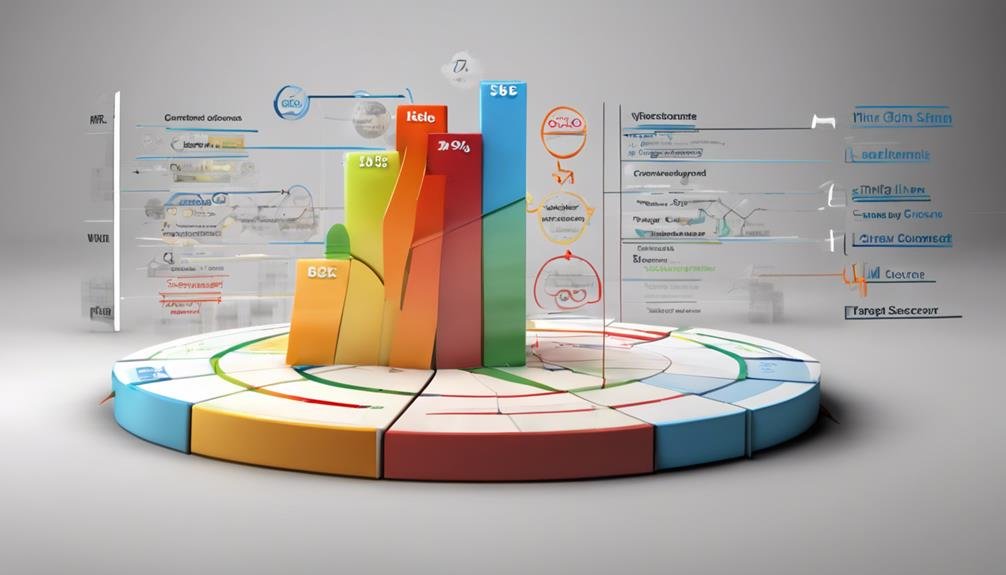What Is a Balanced Scorecard (Bsc), How Is It Used in Business?
The Balanced Scorecard (BSC) is a strategic management tool in business used to evaluate internal functions for enhanced performance. It focuses on improving processes and outcomes by appraising learning, processes, customers, and financial performance. Through components like learning and growth, business processes, customer perspectives, and financial data, it aids in aligning organizations towards strategic objectives. Using the BSC enhances decision-making, communication with stakeholders, and overall organizational performance. By analyzing intellectual capital, driving strategic improvements, and aligning operations, it enables businesses to make informed choices based on holistic insights. Learn more about its application and benefits for operational effectiveness and strategic alignment.
Key Takeaways
- Strategic management tool evaluating and improving internal business functions.
- Measures learning, processes, customers, and financial performance for holistic insights.
- Enhances organizational performance, decision-making, and stakeholder communication.
- Aligns stakeholders with organizational goals and priorities for better alignment.
- Enables operational performance enhancement, strategic improvements, and informed decision-making.
Definition and Purpose of Balanced Scorecard (BSC)
The Balanced Scorecard (BSC) serves as a pivotal strategic management tool designed to evaluate and enhance internal business functions and outcomes across various organizational sectors. By focusing on improving performance, the BSC enables companies to strategically manage their operations effectively.
Originally developed for for-profit entities, the BSC has proven adaptable to non-profit organizations and government agencies, aiding in the identification of inefficiencies and facilitating strategic changes. This strategic framework measures key areas such as learning, processes, customers, and financial performance, providing a thorough view of the organization's health.
Components of Balanced Scorecard (BSC)
In evaluating the Balanced Scorecard (BSC), a detailed examination of its fundamental components reveals key insights into the strategic management framework's operational effectiveness and performance assessment.
The components encompass various critical aspects: learning and growth scrutinize training effectiveness and knowledge management, while business processes assess manufacturing processes' efficiency. Customer perspectives explore satisfaction levels, and financial data provides a thorough understanding of the organization's performance.
Benefits of Using Balanced Scorecard (BSC)
Enhancing organizational performance and strategic decision-making, the application of Balanced Scorecard (BSC) offers a thorough framework that consolidates key operational insights. The benefits of using Balanced Scorecard (BSC) extend beyond just performance metrics. Improved decision-making is a significant advantage, allowing organizations to make informed choices based on a holistic view of their operations. Additionally, the BSC facilitates effective stakeholder communication by aligning everyone with the organization's goals and priorities. Below is a table highlighting the key benefits of using Balanced Scorecard (BSC):
| Benefits | Description |
|---|---|
| Improved Decision Making | Enables informed choices based on holistic insights |
| Stakeholder Communication | Aligns stakeholders with organizational goals and priorities |
Application and Usage of Balanced Scorecard (BSC)
When implementing a Balanced Scorecard (BSC) framework, organizations can effectively analyze their intellectual capital and financial data to drive strategic improvements and operational efficiencies. By measuring intellectual capital and financial data, businesses can break down successes and failures in internal processes, identify inefficiencies, and devise improvement plans.
The BSC allows for the communication of goals and priorities, aiding in aligning the organization towards strategic objectives. Efficiency tracking becomes streamlined as companies recognize areas for enhancement and implement targeted strategies for progress.
Through the application of the Balanced Scorecard, organizations can enhance their performance management systems, leading to more effective decision-making and the continuous advancement of their operations.
Additional Information on Balanced Scorecard (BSC)
An integral aspect of utilizing the Balanced Scorecard (BSC) framework is the thorough analysis and strategic alignment it provides for organizations seeking to enhance their operational performance and effectiveness.
The BSC enables strategic analysis by evaluating performance measurement across four key perspectives: learning and growth, business processes, customer perspectives, and financial data. It helps organizations measure past performance data, identify areas for improvement, and provide feedback for future decisions.
Conclusion
To sum up, the Balanced Scorecard (BSC) is a potent strategic management tool that provides organizations with a thorough framework for evaluating and improving performance across key indicators.
By incorporating learning, processes, customers, and finance into its assessment, the BSC enables businesses to make informed decisions, identify inefficiencies, and drive strategic changes.
Its all-encompassing approach to performance measurement aligns organizational goals and priorities, enhancing overall efficiency and competitiveness.







